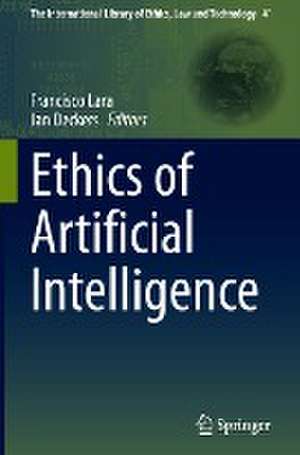Ethics of Artificial Intelligence: The International Library of Ethics, Law and Technology, cartea 41
Editat de Francisco Lara, Jan Deckersen Limba Engleză Hardback – 2 ian 2024
Din seria The International Library of Ethics, Law and Technology
- 15%
 Preț: 700.75 lei
Preț: 700.75 lei - 20%
 Preț: 982.84 lei
Preț: 982.84 lei - 15%
 Preț: 642.83 lei
Preț: 642.83 lei - 15%
 Preț: 643.65 lei
Preț: 643.65 lei - 18%
 Preț: 832.11 lei
Preț: 832.11 lei -
 Preț: 374.37 lei
Preț: 374.37 lei - 15%
 Preț: 647.73 lei
Preț: 647.73 lei -
 Preț: 374.76 lei
Preț: 374.76 lei -
 Preț: 395.47 lei
Preț: 395.47 lei - 15%
 Preț: 586.23 lei
Preț: 586.23 lei - 15%
 Preț: 583.28 lei
Preț: 583.28 lei - 5%
 Preț: 1098.84 lei
Preț: 1098.84 lei - 15%
 Preț: 581.33 lei
Preț: 581.33 lei - 15%
 Preț: 589.14 lei
Preț: 589.14 lei - 15%
 Preț: 693.57 lei
Preț: 693.57 lei - 18%
 Preț: 725.43 lei
Preț: 725.43 lei - 15%
 Preț: 642.68 lei
Preț: 642.68 lei - 15%
 Preț: 640.37 lei
Preț: 640.37 lei -
 Preț: 288.27 lei
Preț: 288.27 lei - 18%
 Preț: 736.94 lei
Preț: 736.94 lei - 15%
 Preț: 640.37 lei
Preț: 640.37 lei - 15%
 Preț: 636.12 lei
Preț: 636.12 lei - 15%
 Preț: 638.24 lei
Preț: 638.24 lei - 5%
 Preț: 713.18 lei
Preț: 713.18 lei - 15%
 Preț: 637.78 lei
Preț: 637.78 lei
Preț: 644.82 lei
Preț vechi: 848.44 lei
-24% Nou
Puncte Express: 967
Preț estimativ în valută:
123.38€ • 128.82$ • 102.12£
123.38€ • 128.82$ • 102.12£
Carte tipărită la comandă
Livrare economică 01-07 aprilie
Preluare comenzi: 021 569.72.76
Specificații
ISBN-13: 9783031481345
ISBN-10: 3031481348
Pagini: 255
Ilustrații: VIII, 255 p. 1 illus.
Dimensiuni: 155 x 235 x 19 mm
Greutate: 0.61 kg
Ediția:2023
Editura: Springer Nature Switzerland
Colecția Springer
Seria The International Library of Ethics, Law and Technology
Locul publicării:Cham, Switzerland
ISBN-10: 3031481348
Pagini: 255
Ilustrații: VIII, 255 p. 1 illus.
Dimensiuni: 155 x 235 x 19 mm
Greutate: 0.61 kg
Ediția:2023
Editura: Springer Nature Switzerland
Colecția Springer
Seria The International Library of Ethics, Law and Technology
Locul publicării:Cham, Switzerland
Cuprins
Chapter 1: Introduction.- Part I: Can an AI System Be Ethical?.- Chapter 2: Bias and Discrimination in Machine Decision-Making Systems.- Chapter 3: Opacity, machine learning and explainable AI.- Chapter 4: The Moral Status of AI Entities.- Part II: Ethical Controversies About AI Applications.- Chapter 5: Ethics of Virtual Assistants.- Chapter 6: Ethics of Virtual Reality.- Chapter 7: Ethical Problems of the Use of Deepfakes in the Arts and Culture.- Chapter 8: Exploring the Ethics of Interaction with Care Robots.- Chapter 9: Ethics of Autonomous Weapons Systems.- Part III: The Need for AI Boundaries.- Chapter 10: Ethical Principles and Governance for AI.- Chapter 11: AI, Sustainability, and Environmental Ethics.- Chapter 12: The Singularity, Superintelligent Machines, and Mind Uploading: The Technological Future?
Notă biografică
Francisco Lara is a professor in the Department of Philosophy at the University of Granada, where he teaches and researches on issues related to applied ethics. Since 2004 he has directed the Research Group on Technological Ethics (GETTEC).
Jan Deckers is a bioethicist at Newcastle University. His research interests include: AI ethics, animal ethics, ecological ethics, health care ethics, leadership, methods, reproductive ethics, and research ethics. His most recent books are Fundamentals of Critical Thinking in Health Care Ethics and Law, published by Owl Press, and Animal (De)liberation, published by Ubiquity Press.
Jan Deckers is a bioethicist at Newcastle University. His research interests include: AI ethics, animal ethics, ecological ethics, health care ethics, leadership, methods, reproductive ethics, and research ethics. His most recent books are Fundamentals of Critical Thinking in Health Care Ethics and Law, published by Owl Press, and Animal (De)liberation, published by Ubiquity Press.
Textul de pe ultima copertă
This book presents the reader with a comprehensive and structured understanding of the ethics of Artificial Intelligence (AI). It describes the main ethical questions that arise from the use of AI in different areas, as well as the contribution of various academic disciplines such as legal policy, environmental sciences, and philosophy of technology to the study of AI. AI has become ubiquitous and is significantly changing our lives, in many cases, for the better, but it comes with ethical challenges. These challenges include issues with the possibility and consequences of autonomous AI systems, privacy and data protection, the development of a surveillance society, problems with the design of these technologies and inequalities in access to AI technologies. This book offers specialists an instrument to develop a rigorous understanding of the main debates in emerging ethical questions around AI. The book will be of great relevance to experts in applied and technology ethics and to students pursuing degrees in applied ethics and, more specifically, in AI ethics.
Caracteristici
Provides an up-to-date overview of various ethical issues around AI Offers a comprehensive and structured understanding of AI ethics Is relevant for experts and students of applied ethics focusing on technology and AI
